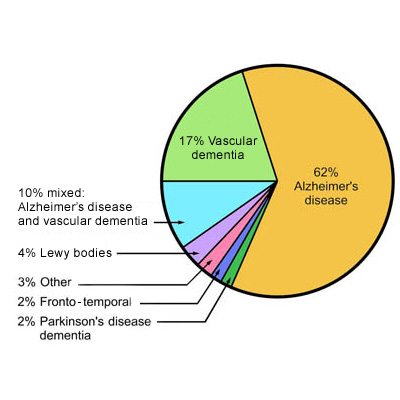
Alzheimer disease most commonly causes dementia. Dementia is characterized by an intellectual loss. Social abilities, too, take a backseat. the daily functioning is hampered. Alzheimer disease is characterized by degeneration of brain tissue. this affects memory and mental abilities.
Normal aging does not cause Alzheimer disease. However, age is one of the risk factors for the disease. Individuals aged between 65 and 74 account for 5% of the total population suffering from Alzheimer’s. nearly 50% of the individuals above the age of 85 develop Alzheimer disease.
Alzheimer disease has no known cure. Treatment can drastically improve quality of life. Support and affection are crucial for both the individual with Alzheimer’s and the caretaker.
Alzheimer disease may begin with partial memory loss and a confused state. it gradually leads to mental impairment that cannot be reversed. this hampers the individual’s ability to reason, learn, remember and imagine.
Memory loss is common for any individual. it is perfectly okay to forget the placement of your car keys and names of people. Alzheimer disease is, however, characterized by severe memory loss. Individuals with Alzheimer’s tend to:
- Repeat events
- Forgetting of appointments
- Misplacing of common objects
- Inability to recollect names of loved ones
Individuals having Alzheimer disease may find it difficult to balance a checkbook. this may gradually lead to problems with numbers. Individuals with Alzheimer’s may find it extremely challenging to find the correct words while expressing their thoughts or feelings. Conversations have an abrupt end. Gradually, the faculties of reading and writing are also hampered.
Such individuals lose their sense of date and time. Familiar surroundings may confuse them. Mundane, everyday situations, such as switching off the stove, become difficult and impossible. Activities that require elaborate planning and judgment cannot be easily performed. Individuals with Alzheimer’s have trouble making decisions.
Routine and familiar tasks take a backseat. Over a period of time, individuals fail to perform the simplest tasks.
Individuals with Alzheimer disease display the following:
- Mood swings
- Loss of trust
- Stubbornness
- Withdrawal from society
- Anxiety
- Depression
- Aggressive behavior
There is no predominant factor that causes Alzheimer disease. A combination of factors relating to genetics, environment, and lifestyle plays a role. more research is needed in the field of Alzheimer causes. However, the effects of Alzheimer’s on tissue of the brain are well known. Alzheimer disease damages brain cells, eventually leading to their death.